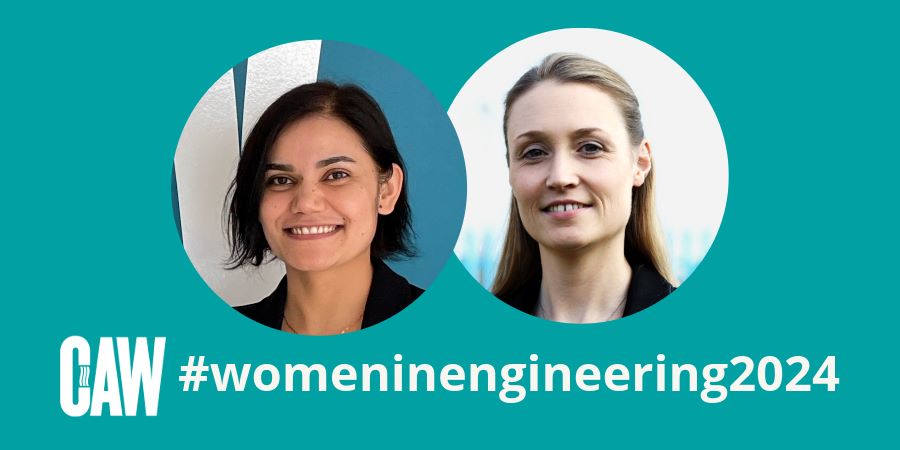Women in Engineering: Meet Harsha and Clare

For Women in Engineering Day 2024, we caught up with two members of our Project Engineering Team to find out what brought them to CAW and to hear about their experiences in the water industry.
Harsha Pundir, Senior Project Engineer
What inspired you to study Engineering and specialise in Water?
From a young age, I knew I was keen to work in the Engineering sector.
After completing my degree in Civil Engineering, I joined India’s Water Corporation as a Civil Engineer. A government position like this is very sought after in India and provides excellent job security, so it is rare for people to choose to leave such a role. However, I was very keen to gain knowledge and experience of innovations and new technologies in the sector, so I decided to leave to further my studies and knowledge abroad, as my ultimate aim was to build my knowledge and experience with the newest technologies with a view to introducing upcoming technologies to India in the future.
I selected University College Dublin (UCD) to complete my Masters in Water, as this offered more technical content, and then sought to gain practical experience in the water industry in Ireland.
Tell us more about what led you to join CAW as a Senior Project Engineer
On completing my Masters I worked as a Senior Associate for a government body in Ireland before joining CAW a year ago as a Senior Project Engineer. I intend to further develop my skills and experience and progress to Project Manager. Since starting I have completed my Project Supervisor construction and design process training (PSDS and PSDP), and am looking to complete my Project Management Professional (PMP) certification over the next six months. I am also managing a project with guidance from senior managers to gain valuable experience and demonstrate my project management skills.
What does an average day look like in a Project Engineering role?
My days can be varied and involves a combination of working in the office and making site visits as projects progress. Here are some examples of what I may do on an average day:
- Producing technical docs required by a client or supplier.
- Managing all aspects of a project from start to finish – from design to construction, commissioning and client handover.
- Liaising with suppliers and contractors to ensure the smooth progression of all aspects of a project, such as monitoring site progress, etc.
Have you had any negative experiences as a woman in your role?
Women were in the minority in my undergraduate course, and when I joined the workplace at the Water Corporation, whilst there were many women in clerical and management roles, I was the first female Engineer in the City. It was not usual for a female to be on-site and speak to contractors, so I initially found it daunting, but fortunately, I had inspiring seniors and people on site were approachable and accepting.
Have you met or worked with other influential women in engineering who inspire you?
Clare at CAW is smart and experienced so I am learning a lot from her in my current role – not only on the engineering side but also her approach. In my previous role, I gained great insights from a female manager on how to build and develop relationships in a male-dominated environment.
Clare Duggan, Senior Project Manager
Tell us a bit more about your journey to becoming a Senior Project Manager at CAW
Before CAW, I worked for design consultancies in New Zealand, Ireland and Canada designing water and wastewater treatment plants. I was keen to move from the design side into construction and felt my background in wastewater design provided a good foundation for a role in Project Engineering. I had to do a bit of convincing via the recruiter, as CAW initially had concerns about how well the transition would work from design projects to construction-based projects, but my usual relentless pestering paid off and I got the opportunity to interview. The rest is history and I have been managing projects at CAW for 9 years.
Whilst I wouldn’t say I have always “dreamt” of a role in Engineering. My strongest subjects at school were maths, the sciences and business which meant college options varied from Engineering to Commerce. Engineering became top of my list, so when I got offered a place for my first choice that’s where my engineering journey began.
Have you experienced any barriers working in a male-dominated industry?
I am pleased to say I have never encountered any negative reaction to my presence, in meetings or on-site. In fact, I sometimes feel that I have been treated with more respect than my male counterparts.
Do you think the water and engineering industries need to do more to encourage women to join the sector?
I feel the responsibility for encouraging more women to consider engineering and water industry roles shouldn’t just lie with industry. By introducing guidance, resources and opportunities to expose students to various careers from a young age (particularly in areas where a gender imbalance exists) we can help young women to select careers which suit their skill sets and will have the ability to engage them throughout their professional lives.
For instance, girls’ schools could visit engineering practices and construction sites where demonstrations and talks could be used to give the students a sample of the challenges and opportunities that are present in the industry.